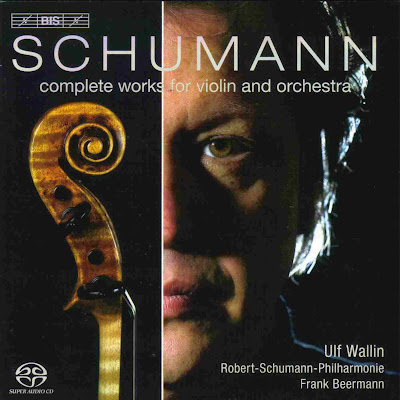
SCHUMANN Works for Violin & Orchestra
ULF WALLIN, Violin
Robert-Schumann-Philharmonic / Franz Beerman
BIS SACD-1775 / ****1/2
Did Robert Schumann really compose three violin concertos, as this album has us believe? The one most listeners know of is the D minor concerto (1853), his last orchestral work. Suppressed by his widow Clara, it was not heard until 1937. It is a somewhat rambling 32-minute work with pleasant if not totally memorable themes, closing with a slow but stately polonaise-like finale. The only violin concertante work he heard in his lifetime was the Fantasy in C major (Op.131) of 1853, adopting the slow-fast two part form that displays both lyricism and virtuosity to equal degree.
The best music is however reserved for Schumann’s own violin version of his 1850 Cello Concerto in A minor (Op.129), premiered as recently as 1987. It is a bona fide original violin concerto, not to be confused with Shostakovich’s orchestration of the same work. With its own share of thrills and spills, one hardly misses the original cello solo itself. Swedish violinist Ulf Wallin extracts every last ounce of its bittersweet melodies, contrasting the emotional peaks and troughs with great alacrity. Well supported by the Chemnitz orchestra renamed after the composer, this is a persuasive case for an often overlooked genius.
ULF WALLIN, Violin
Robert-Schumann-Philharmonic / Franz Beerman
BIS SACD-1775 / ****1/2
Did Robert Schumann really compose three violin concertos, as this album has us believe? The one most listeners know of is the D minor concerto (1853), his last orchestral work. Suppressed by his widow Clara, it was not heard until 1937. It is a somewhat rambling 32-minute work with pleasant if not totally memorable themes, closing with a slow but stately polonaise-like finale. The only violin concertante work he heard in his lifetime was the Fantasy in C major (Op.131) of 1853, adopting the slow-fast two part form that displays both lyricism and virtuosity to equal degree.
The best music is however reserved for Schumann’s own violin version of his 1850 Cello Concerto in A minor (Op.129), premiered as recently as 1987. It is a bona fide original violin concerto, not to be confused with Shostakovich’s orchestration of the same work. With its own share of thrills and spills, one hardly misses the original cello solo itself. Swedish violinist Ulf Wallin extracts every last ounce of its bittersweet melodies, contrasting the emotional peaks and troughs with great alacrity. Well supported by the Chemnitz orchestra renamed after the composer, this is a persuasive case for an often overlooked genius.

ECHOES
Seattle Symphony / GERARD SCHWARZ
Naxos 8.559679 / ****1/2
The progress of modern music has mostly been in incremental steps, founded upon tried and tested past models. This anthology of new American orchestral works revisits older examples, seen and heard through the prism of time and changing musical tastes. At its simplest, Bright Sheng’s Black Swan is a lush transcription of Brahms’s Intermezzo in A major for piano (Op.118 No.2), with no new harmonies offered. Aaron Jay Kernis’s Musica Celestis is an amplification of a pre-existing movement from his own First String Quartet, having the same moving effect as works by Vaughan Williams and Barber.
Venturing further afield, David Stock’s Horn Of Plenty plays with motifs from Jeremiah Clarke’s popular Trumpet Voluntary before finally quoting the famous march it its entirety. David Schiff’s Infernal turns the Danse Infernal from Stravinsky’s Firebird into a brassy score in the style of B-grade pulp movie music. John Harbison’s Rubies is a fantasia on Thelonious Monk’s standard Ruby, My Dear, and the final result is a luxuriant wallow. Conductor Schwarz himself takes on Handel’s three concerto grosso movements for a Concerto for brass quintet, a virtuoso vehicle that is guaranteed to be heard regularly. Performed with polish and much spirit, this is recommended listening.
Seattle Symphony / GERARD SCHWARZ
Naxos 8.559679 / ****1/2
The progress of modern music has mostly been in incremental steps, founded upon tried and tested past models. This anthology of new American orchestral works revisits older examples, seen and heard through the prism of time and changing musical tastes. At its simplest, Bright Sheng’s Black Swan is a lush transcription of Brahms’s Intermezzo in A major for piano (Op.118 No.2), with no new harmonies offered. Aaron Jay Kernis’s Musica Celestis is an amplification of a pre-existing movement from his own First String Quartet, having the same moving effect as works by Vaughan Williams and Barber.
Venturing further afield, David Stock’s Horn Of Plenty plays with motifs from Jeremiah Clarke’s popular Trumpet Voluntary before finally quoting the famous march it its entirety. David Schiff’s Infernal turns the Danse Infernal from Stravinsky’s Firebird into a brassy score in the style of B-grade pulp movie music. John Harbison’s Rubies is a fantasia on Thelonious Monk’s standard Ruby, My Dear, and the final result is a luxuriant wallow. Conductor Schwarz himself takes on Handel’s three concerto grosso movements for a Concerto for brass quintet, a virtuoso vehicle that is guaranteed to be heard regularly. Performed with polish and much spirit, this is recommended listening.

No comments:
Post a Comment